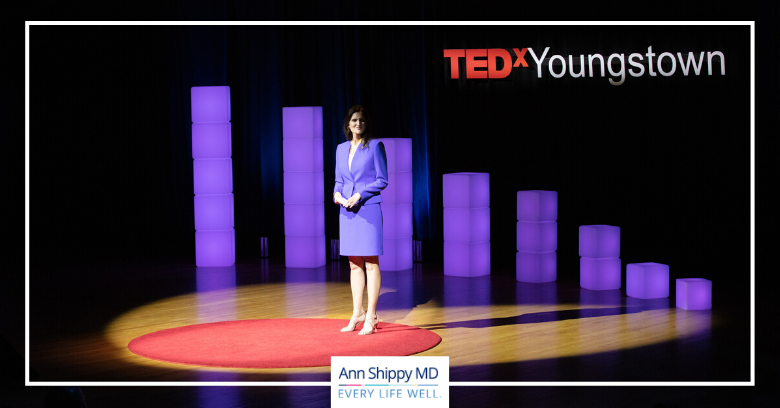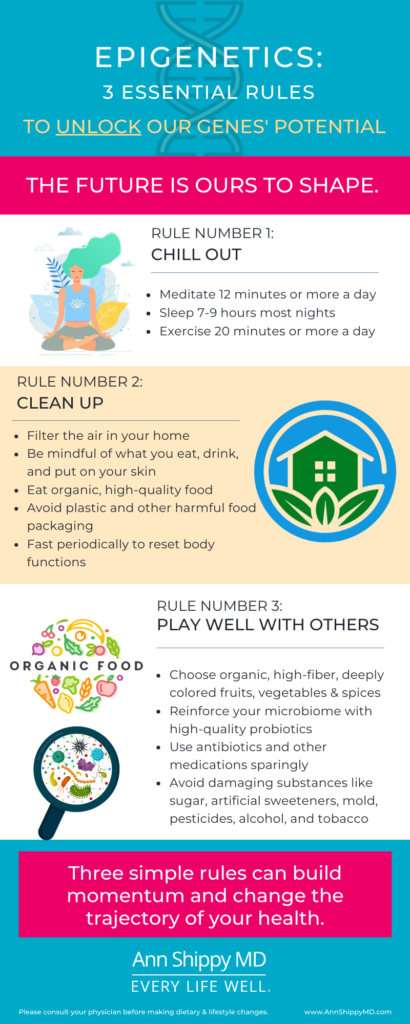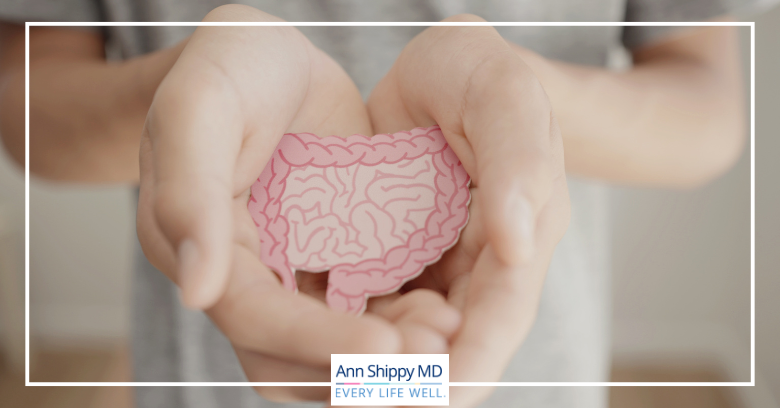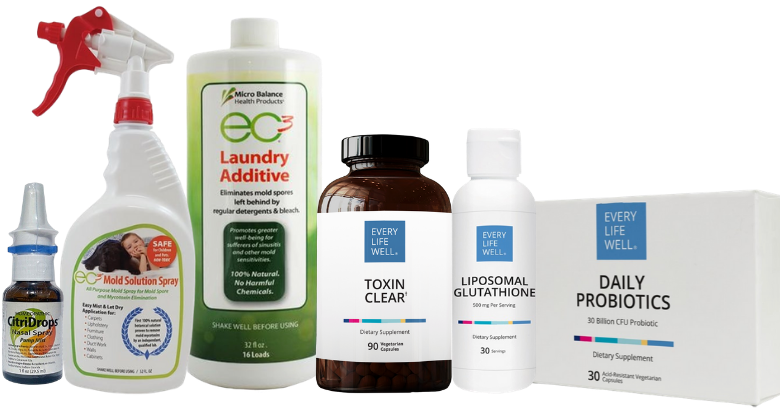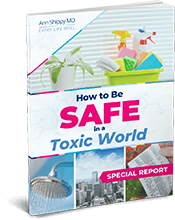I’m so pleased to share with you the culmination of years of study and months of preparation and rehearsal… my TEDx performance in Youngstown, Ohio.
The topic? Epigenetics– which is truly the overarching cause-and-effect factor that is the missing piece of our contemporary health puzzle. What we are learning now about epigenetics is showing us that what we do today, in each moment, can have an effect on not only our own gene expression, but even our children and grandchildren’s future gene expression!
My goal was to bring you the most leading-edge information, so we were challenged with coordinating with TED’s main office on what was permissible to meet their guidelines. That situation meant that, unfortunately, I was making changes to my talk literally the night before! Despite that challenge, I am very happy with the outcome and look forward to hearing what you think.
If you are so inclined, it really helps me to get the word out by doing the following:
- Go here to the video’s home on YouTube and “Like” the video with a thumbs up,
- Comment on the video, and
- Share the video with others.
Thank you! The transcript and all 69 citations given on the slides are here below with links.
TRANSCRIPT:
I’m two years old, and we’re at Donna’s house, my mom’s best friend, with my baby sister, Laura. Of course, she gets all the attention, but while they’re focused on her, I see it: a sparkling crystal dish on a little wooden cabinet nearby with yummy jellybeans.
Should I or shouldn’t I? I might get in trouble. I’m not usually allowed to have candy. But they’re so focused on Laura, I take my chance.
Mom and Donna are sitting right there, and they can easily see me, but they don’t know about my special hiding trick.
If I can’t see them, they can’t see me! I dig in. Suddenly, I hear laughter, and they’re over there laughing hysterically at me thinking that I have hidden myself.
Now I’m sure none of you have ever misbehaved… but many of us like to see what we can get away with regarding our health. We think if we cover our eyes and pretend, we can behave in any way we want and we won’t suffer any consequences.
That’s what I thought, and it resulted in a life-threatening medical scare at the age of 31 that left me feeling alone and broken. After I recovered, I left a career that I loved as a chemical engineer at IBM to embark on a vigorous quest to create a different kind of medical practice, one where I look for the root cause of illness and use the latest technology and testing and research to help my patients like a detective.
The testing that I use allows me to look at each patient’s unique genetics, the environmental toxin levels, and the intricate ecosystem of the gut microbiome, and so much more. In fact, what I’ve learned from helping my patients and diving into the latest research and testing in genetics is this:
We can influence our genes’ behavior, meaning even though we’re born with our genes, our daily choices can influence the chemical modifications around the genes to either move towards a healthy state or a less healthy one.
Although this may sound surprising, it’s based on an impressive and growing body of research called epigenetics, which is how the chemical modifications around the genes can be influenced and determine how active the genes are.
It’s similar to pixels of the computer monitor. All the pixels have the same potential, yet each pixel acting differently allows the computer monitor to create an infinite array of images, colors, and words. All of this happens because individual pixels are turned on, off, up, or down, and your DNA is regulated in a similar way. A cell from your liver has the same DNA as a cell from your eyeball. Since all the cells in our body have the same DNA, that means there’s other processes that determine how individual cells develop, differentiate, and behave. This is how some cells help us to filter our blood, while others allow us to see. The gene expression in every cell is continuously adjusting to adapt to our current situation and environment.
Lifestyle factors unquestionably alter these pixels, and we can dramatically change the trajectory of our health and move our momentum by knowing which dials to turn, levers to switch. Our genes alone are not our destiny.
As kids, we’re taught, “Mind your manners and tell the truth.” And even though epigenetics is a complex subject, it can be as simple as teaching a child to say please and thank you. We can begin to unlock our genes’ potential with three essential rules.
Rule number one: Chill Out. Stress has been linked to Alzheimer’s, cardiovascular diseases, diabetes, and so many degenerative diseases. Managing our stress with meditation, sleep, and exercise, we can collaborate with our genes. And this is critical, because cumulative lifetime stress accelerates epigenetic aging. Meditation used to be considered “woo-woo,” but now, extensive research has been showed to rebuild telomere length onto our genes, influence gene expression involved in inflammation and blood flow, and actually improve the way that our bodies respond to stress.
In a study with recent heart attack survivors, those who chilled out with meditation for six months actually changed their blood vessels and decreased the epigenetic expression of three important inflammatory genes. If there was a drug that did this, it could be a billion-dollar drug, and we’d probably all want to take it. But what if every cardiologist, neurologist, really every physician taught meditation in their office? How much pain and suffering and medical expenses would we save?
Until that happens, let’s start with three simple habits.
Habit number one is to just meditate 12 minutes or more a day, sleep seven to nine hours most nights, and exercise 20 minutes or more a day. Of course, get permission from your physician to start a new exercise program.
And then rule number two: Clean Up. We all know we need to clean up our own messes, but most of us don’t realize the invisible mess that we’ve made inside our cells and organs. Every day, we’re exposed to small amounts of imperceptible toxins that can build up in our bodies, and I see the consequences in my patients and in myself. We think a little bit won’t hurt us, but toxicity is often cumulative. Among other effects, the exposure affects our epigenetics. When I measure these in my medical practice, I see that making lifestyle changes and taking the right nutritional supplements decreases the toxin levels in my patients.
To think that things like pesticides, mold, plastics like BPA, and heavy metals, and other toxins like tobacco smoke, air pollution, and alcohol don’t have lasting consequences on our health is like covering our eyes and pretending it’s not affecting us.
These toxins are extensively studied for epigenetic effects, and testing often reveals that they’re present in my patients. There’s a new test that may become widely available in the future that allows us to see specifically how environmental toxins are affecting specific genes. One of my patients in her sixties was noticing that her memory was declining. When we ran this test, she had a toxin from mold that was attached to a gene that increases the risk for Alzheimer’s. Eight months later, after implementing the recommended nutritional supplements and lifestyle changes, we reran the test, and the toxins were removed, and she was even recalling words more easily.
Every day, we encounter toxic exposures from places and products that we wouldn’t expect, like our mattresses, seafood, food and beverage packaging, and even BPA on grocery receipts. Instead of being alarmed, we can be informed and take action on the things that we can control, and help our bodies to detoxify what we can’t control.
Here are some effective actions that I’ve taken to help myself clean up.
I’m aware of the quality of the air that I breathe, and I filter the air in my home to reduce the outgassing that can happen in my environment. I’m careful about what I put on my skin. I eat and drink the cleanest food that I can, buying organic, high-quality food, and I eat lots of vegetables like broccoli, the cruciferous vegetables, and I pay attention to the food preparation and packaging. And then, several days a month, I restrict my calories to reset important functions, either by intermittent fasting or a new area of research called fasting mimicking that’s heavily funded and getting excellent results. Again, check with your physician to see if fasting is a good option for you.
And finally, rule number three: Play Well with Others. One of our most important relationships is with our own microbiome. It’s like a little army of organisms that either work with us or against us. It’s made up of parasites, bacteria, viruses, and fungi, which some people may think is a bad thing, but really, they’re fighting to keep us healthy. Collectively, they have 100 to 200 times more genetic material than we do, and when they’re friendly and cared for, they really help to keep us healthy. Among other roles, the microbiome helps to provide the resources we need to control our genes, and an imbalanced microbiome can lead to instability in the entire epigenetic process, and that affects many functions in our body.
Fortunately, there are recent advances in testing that allow us to look more deeply into what’s going on in the body and with the microbiome, and because of this, we can measure and correct the imbalances. And my patients often notice improved blood sugar levels, better mood, stronger immune systems, and reduced autoimmunity, and more. These organisms are particularly affected by what we ingest and the toxins we’re exposed to.
We can care for the organisms that benefit us by choosing organic, high-fiber, deeply colored fruits and vegetables and spices with complex phytochemicals, and reinforce them with high-quality probiotics. We can use antibiotics and other medications only when necessary and recommended by our physicians, and we can avoid damaging substances like sugar, artificial sweeteners, mold, pesticides, alcohol, and tobacco.
These habits may be new for you, and consistent practice is key. Research with professional musicians showed that practice increased the genetic expression for their auditory aptitude, meaning their practice helped their genes optimize their hearing, and practice can help you too.
The future is ours to shape. Three simple rules can build momentum and change the trajectory of your health. When you’re committed to chilling out, cleaning up, and playing well with others, you can change the trajectory of your health towards a healthy and vibrant life.
With our eyes wide open now, we can begin to control our environment instead of it controlling us. And in fact, we must, because our health, our happiness, our future depend on our choices today. And the next time you see a sparkling dish of candy, just remember, your genes can see you! Thank you.
Citations:
- Alegria-Torres, Jorge, et. al., Epigenetics and Lifestyle. 2011 June; 3(3): 267-277. https://www.ncbi.nlm.nih.gov/pmc/articles/PMC3752894/
- Keating, Samuel and Assam El-Osta, Epigenetics and Metabolism. Circulation Research. 2015; 116: 715-736. https://www.ahajournals.org/doi/10.1161/CIRCRESAHA.116.303936
- Morgan, H.L., and A.J. Watkins, Transgenerational Impact of Environmental Change. Adv Exp Med Biol. 2019; 1200: 71-89. https://www.ncbi.nlm.nih.gov/pubmed/31471795
- Latchney, Sarah E, et. al. Linking inter-individual variability to endocrine disruptors: insights for epigenetic inheritance. Mammalian Genome. 29,1-2 (2018): 141-152. https://www.ncbi.nlm.nih.gov/pmc/articles/PMC5849504/
- Keating, Samuel and Assam El-Osta, Epigenetics and Metabolism. Circulation Research. 2015; 116: 715-736. https://www.ahajournals.org/doi/10.1161/CIRCRESAHA.116.303936
- Machado, A., et. al., Chronic Stress as a Risk Factor for Alzheimer’s Disease. Rev Neurosci. 2014; 25(6): 785-804. https://www.ncbi.nlm.nih.gov/pubmed/25178904
- Golbidi, Saeid, et. al., Chronic stress impacts the cardiovascular system: animal models and clinical outcomes. American Journal of Physiology-Heart and Circulatory Physiology. 2015; 308:12, H1476-H1498 https://www.ncbi.nlm.nih.gov/pubmed/25888514
- Wirtz, P.H. & von Känel, R. Psychological Stress, Inflammation, and Coronary Heart Disease. Curr Cardiol Rep (2017) 19: 111. https://www.ncbi.nlm.nih.gov/pubmed/28932967
- Joseph, J. J. & Golden, S. H., Cortisol dysregulation: the bidirectional link between stress, depression, and type 2 diabetes mellitus. N.Y. Acad. Sci., 2017; 1391: 20-34. https://www.ncbi.nlm.nih.gov/pmc/articles/PMC5334212/
- Zannas, Anthony, Lifetime stress accelerates epigenetic aging in an urban, African American cohort: relevance of glucocorticoid signaling. Genome Biol. 2015; 16: 266. https://www.ncbi.nlm.nih.gov/pmc/articles/PMC4699359/
- Maekawa, T, Liu, B, Liu, Y, et. al. Stress‐induced and ATF7‐dependent epigenetic change influences cellular senescence. Genes Cells. 2019; 00: 1– 9. https://www.ncbi.nlm.nih.gov/pubmed/31294895
- Aitbaev KA, Molecular mechanisms of aging: the role of oxidative stress and epigenetic modifications. Adv Gerontol. 2019;32(1-2):20-28. https://www.ncbi.nlm.nih.gov/pubmed/31228364
- Mayer, Stefanie E., et. al., Cumulative lifetime stress exposure and leukocyte telomere length attrition: The unique role of stressor duration and exposure timing. 2019; 104: 210-218. https://www.ncbi.nlm.nih.gov/pubmed/30884304
- McEwen, Bruce, Neurobiological and Systemic Effects of Chronic Stress. Chronic Stress (Thousand Oaks). 2017 Jan-Dec; 1: 10. https://www.ncbi.nlm.nih.gov/pmc/articles/PMC5573220/
- Epel, Elissa, et. al., Can Meditation Slow Rate of Cellular Aging? Cognitive Stress, Mindfulness, and Telomeres. Ann N Y Acad Sci. 2009 Aug; 1172: 34-53. https://www.ncbi.nlm.nih.gov/pmc/articles/PMC3057175/
- Keng, Shian-Ling, et. al., Association among dispositional mindfulness, self-compassion, and leukocyte telomere length in Chinese adults. BMC Psychol. 2019; 7: 47. https://www.ncbi.nlm.nih.gov/pmc/articles/PMC6647116/
- Innes, KE, Effects of Meditation and Music-Listening on Blood Biomarkers of Cellular Aging and Alzheimer’s Disease in Adults with Subjective Cognitive Decline: An Exploratory Randomized Clinical Trial. J Alzheimers Dis. 2018;66(3):947-970. https://www.ncbi.nlm.nih.gov/pubmed/30320574
- Rathore, M & Abraham, J, Implication of Asana, Pranayama and Meditation on Telomere Stability. Int J Yoga. 2018 Sep-Dec;11(3):186-193. https://www.ncbi.nlm.nih.gov/pubmed/30233111
- Alda, M, Zen Meditation, Length of Telomeres, and the Role of Experiential Avoidance and Compassion. 2016; 7:651-659. https://www.ncbi.nlm.nih.gov/pubmed/27217844
- Conklin, QA, Insight meditation and telomere biology: The effects of intensive retreat and the moderating role of personality. Brain Behav Immun. 2018 May; 70:233-245. https://www.ncbi.nlm.nih.gov/pubmed/29518528
- Hoge, EA, Loving-Kindness Meditation practice associated with longer telomeres in women. Brain Behav Immun. 2013 Aug; 32:159-63. https://www.ncbi.nlm.nih.gov/pubmed/23602876
- Schutte, NS, & Malouff, JM, A meta-analytic review of the effects of mindfulness meditation on telomerase activity. 2014 Apr;42:45-8. https://www.ncbi.nlm.nih.gov/pubmed/24636500
- Rima, D, Oxidative Stress Induced Damage to Paternal Genome and Impact of Meditation and Yoga – Can it Reduce Incidence of Childhood Cancer? Asian Pac J Cancer Prev. 2016 Jan 9;17(9):4517-4525. https://www.ncbi.nlm.nih.gov/pubmed/27880996
- Duraimani, Shanthi, et. al., Effects of Lifestyle Modification on Telomerase Gene Expression in Hypertensive Patients: A Pilot Trial of Stress Reduction and Health Education Programs in African Americans. PLoS One. 2015; 10(11): e0142689. https://www.ncbi.nlm.nih.gov/pmc/articles/PMC4646647/
- Hoge, EA, et. al., The effect of mindfulness meditation training on biological acute stress responses in generalized anxiety disorder. Psychiatry Res. 2018 Apr; 262: 328-332. https://www.ncbi.nlm.nih.gov/pubmed/28131433
- Kwak, S, The Immediate and Sustained Positive Effects of Meditation on Resilience Are Mediated by Changes in the Resting Brain. Front Hum Neurosci. 2019 Mar 26;13:101. https://www.ncbi.nlm.nih.gov/pubmed/30983980
- Dal Lin, C., et. al., Thoughts modulate the expression of inflammatory genes and may improve the coronary blood flow in patients after a myocardial infarction. J Tradit Complement Med. 2017 May 29; 8(1): 150-163 https://www.ncbi.nlm.nih.gov/pubmed/29322004
- Keating, Samuel and Assam El-Osta, Epigenetics and Metabolism. Circulation Research. 2015; 116: 715-736. https://www.ahajournals.org/doi/10.1161/CIRCRESAHA.116.303936
- Chaix, R, Epigenetic clock analysis in long-term meditators. 2017 Nov; 85:210-214. https://www.ncbi.nlm.nih.gov/pubmed/28889075
- Cheung, V., et. al., The effect of sleep deprivation and disruption on DNA damage and health of doctors. 2019 Apr; 74(4): 434-440. https://www.ncbi.nlm.nih.gov/pubmed/30675716
- Moreno-Villanueva, M, The degree of radiation-induced DNA strand breaks is altered by acute sleep deprivation and psychological stress and is associated with cognitive performance in humans. 2018 Jul 1; 41(7). https://www.ncbi.nlm.nih.gov/pubmed/29596659
- Qureshi, IA, Epigenetics of sleep and chronobiology. Curr Neurol Neurosci Rep. 2014 Mar;14(3):432. https://www.ncbi.nlm.nih.gov/pubmed/24477387
- Moreno-Villanueva, M, The degree of radiation-induced DNA strand breaks is altered by acute sleep deprivation and psychological stress and is associated with cognitive performance in humans. 2018 Jul 1; 41(7). https://www.ncbi.nlm.nih.gov/pubmed/29596659
- Jacques, M., et. al., Epigenetic changes in healthy human skeletal muscle following exercise- a systematic review. 2019 Jul; 14(7): 633-648. https://www.ncbi.nlm.nih.gov/pubmed/31046576
- Rea, Irene M, Towards aging well: Use it or lose it: Exercise, epigenetics and cognition. 2017; 18(4): 679–691. https://www.ncbi.nlm.nih.gov/pmc/articles/PMC5514203/
- Hou, Lifang, et. al., Environmental chemical exposures and human epigenetics. International Journal of Epidemiology. 2012 Feb; 41(1): 79-105. https://academic.oup.com/ije/article/41/1/79/645872
- Santoro, A, et. al., Neuro-toxic and reproductive effects of BPA. Curr Neuropharmacol. 2019 Jul 26. https://www.ncbi.nlm.nih.gov/pubmed/31362658
- Crinnion, Walter & Pizzorno, Joseph, Clinical Environmental Medicine: Identification & Natural Treatment of Disease Caused by Common Pollutants (Medical Textbook), Elsevier Publishing, 2019.
- Latchney, Sarah E et. al., Linking inter-individual variability to endocrine disruptors: insights for epigenetic inheritance. Mammalian Genome. 29,1-2 (2018): 141-152. https://www.ncbi.nlm.nih.gov/pmc/articles/PMC5849504/
- Poston, Robert G., et. al., Epigenetic Effects of Polybrominated Diphenyl Ethers on Human Health. J. Environ. Res. Public Health. 2019; 16(15):2703 https://www.mdpi.com/1660-4601/16/15/2703/htm
- Cavalli, G, & Heard, E, Advances in epigenetics link genetics to the environment and disease. 2019 Jul; 571(7766):489-499. https://www.ncbi.nlm.nih.gov/pubmed/31341302
- Dai, Y, et. al., Aflatoxin B1-induced epigenetic alterations: An overview. Food Chem Toxicol. 2017 Nov; 109(Pt 1):683-689. https://www.ncbi.nlm.nih.gov/pubmed/28645871
- Zhu, L, et. al., A Review: Epigenetic Mechanism in Ochratoxin A Toxicity Studies. Toxins (Basel). 2017 Mar 23; 9(4). https://www.ncbi.nlm.nih.gov/pubmed/28333080
- Sahay, D, et. al., Is breast cancer a result of epigenetic responses to traffic-related air pollution? A review of the latest evidence. 2019 May 1;11(6):701-714. https://www.ncbi.nlm.nih.gov/pubmed/31070457
- Xavier, MJ, et. al., Transgenerational inheritance: how impacts to the epigenetic and genetic information of parents affect offspring health. Hum Reprod Update. 2019 Aug 2; pii: dmz017. https://www.ncbi.nlm.nih.gov/pubmed/31374565
- Morgan, HL, & Watkins, AJ, Transgenerational Impact of Environmental Change. Adv Exp Med Biol. 2019;1200:71-89. https://www.ncbi.nlm.nih.gov/pubmed/31471795
- Baccarelli, A & Bollati, V, Epigenetics and environmental chemicals. Curr Opin Pediatr. 2009 Apr; 21(2): 243–251. https://www.ncbi.nlm.nih.gov/pmc/articles/PMC3035853/
- Safieh, M, et. al., ApoE4: an emerging therapeutic target for Alzheimer’s disease. BMC Medicine. 2019; 17:64. https://bmcmedicine.biomedcentral.com/articles/10.1186/s12916-019-1299-4
- Bernier, M, & Vandenberg, L, Handling of thermal paper: Implications for dermal exposure to bisphenol A and its alternatives. PLoS One. 2017; 12(6): e0178449. https://www.ncbi.nlm.nih.gov/pmc/articles/PMC5453537/
- Latchney, Sarah E, et. al. Linking inter-individual variability to endocrine disruptors: insights for epigenetic inheritance. Mammalian Genome. 29,1-2 (2018): 141-152. https://www.ncbi.nlm.nih.gov/pmc/articles/PMC5849504/
- Tran, N & Miyake, K, Neurodevelopmental Disorders and Environmental Toxicants: Epigenetics as an Underlying Mechanism. Int J Genomics. 2017: 7526592. https://www.ncbi.nlm.nih.gov/pmc/articles/PMC5439185/
- Hou, Lifang, et. al., Environmental chemical exposures and human epigenetics. International Journal of Epidemiology. 2012 Feb; 41(1): 79-105. https://academic.oup.com/ije/article/41/1/79/645872
- Watson, G, et. al., Phytochemicals from Cruciferous Vegetables, Epigenetics, and Prostate Cancer Prevention. AAPS J. 2013 Oct; 15(4): 951–961. https://www.ncbi.nlm.nih.gov/pmc/articles/PMC3787240/
- Hartle, J, et. al., The consumption of canned food and beverages and urinary Bisphenol A concentrations in NHANES 2003–2008. Environ Res. 2016 Oct; 150: 375–382. https://www.ncbi.nlm.nih.gov/pmc/articles/PMC5003675/
- Hanjani, N, et. al., Protein Restriction, Epigenetic Diet, Intermittent Fasting as New Approaches for Preventing Age-Associated Diseases. Int J Prev Med. 2018; 9: 58. https://www.ncbi.nlm.nih.gov/pmc/articles/PMC6036773/
- Alam, R, et. al., Microbiome, inflammation, epigenetic alterations, and mental diseases. Am J Med Genet B Neuropsychiatr Genet. 2017 Sep;174(6):651-660. https://www.ncbi.nlm.nih.gov/pubmed/28691768
- Qin, J, et. al., A human gut microbial gene catalogue established by metagenomic sequencing. 2010 Mar; 464: 59–65. https://www.nature.com/articles/nature08821
- Househam, AM, et. al., The Effects of Stress and Meditation on the Immune System, Human Microbiota, and Epigenetics. Adv Mind Body Med. 2017 Fall;31(4):10-25. https://www.ncbi.nlm.nih.gov/pubmed/29306937
- Gadecka, A, et. al., Slowing Down Aging: The Role of Nutrients and Microbiota in Modulation of the Epigenome. 2019 Jun 1; 11(6). https://www.ncbi.nlm.nih.gov/pubmed/31159371
- Zhu, CC, et. al., Effect of mycotoxin-containing diets on epigenetic modifications of mouse oocytes by fluorescence microscopy analysis. Microsc Microanalysis. 2014 Aug;20(4):1158-66. https://www.ncbi.nlm.nih.gov/pubmed/24810297
- Hullar, M, & Fu, B, Diet, the Gut Microbiome, and Epigenetics. Cancer J. 2014 May-Jun; 20(3): 170–175. https://www.ncbi.nlm.nih.gov/pmc/articles/PMC4267719/
- Dong, T, & Gupta, A, Influence of Early Life, Diet, and the Environment on the Microbiome. Clin Gastroenterol Hepatol. 2019 Jan; 17(2): 231–242. https://www.ncbi.nlm.nih.gov/pmc/articles/PMC6422042/
- Schiffman, SS, & Nagle, HT, Revisited: Assessing the in vivo data on low/no-calorie sweeteners and the gut microbiota. Food Chem Toxicol. 2019 Oct;132:110692. https://www.ncbi.nlm.nih.gov/pubmed/31351100
- Grine G, et. al., Tobacco Smoking Affects the Salivary Gram-Positive Bacterial Population. Front Public Health. 2019 Jul 19; 7:196. https://www.ncbi.nlm.nih.gov/pubmed/31380336
- Du, K, et. al., Effects of Dietary Mycotoxins on Gut Microbiome. Protein Pept Lett. 2017 May 10; 24(5):397-405. https://www.ncbi.nlm.nih.gov/pubmed/28240164
- Qamar, N, et. al., Systemic review and meta-analysis of alcohol induced gut dysbiosis and the resulting behavioral impact. Behav Brain Res. 2019 Aug 30:112196. https://www.ncbi.nlm.nih.gov/pubmed/31476330
- Rueda-Ruzafa, L, et. al., Gut microbiota and neurological effects of glyphosate. 2019 Aug 20;75:1-8. https://www.ncbi.nlm.nih.gov/pubmed/31442459
- Van Bruggen, AHC, et. al., Environmental and health effects of the herbicide glyphosate. Sci Total Environ. 2018 Mar;616-617:255-268. https://www.ncbi.nlm.nih.gov/pubmed/29117584
- Barrett, Karen, et. al., Art and science: how musical training shapes the brain. Front Psychol. 16 October 2013. https://www.frontiersin.org/articles/10.3389/fpsyg.2013.00713/full
